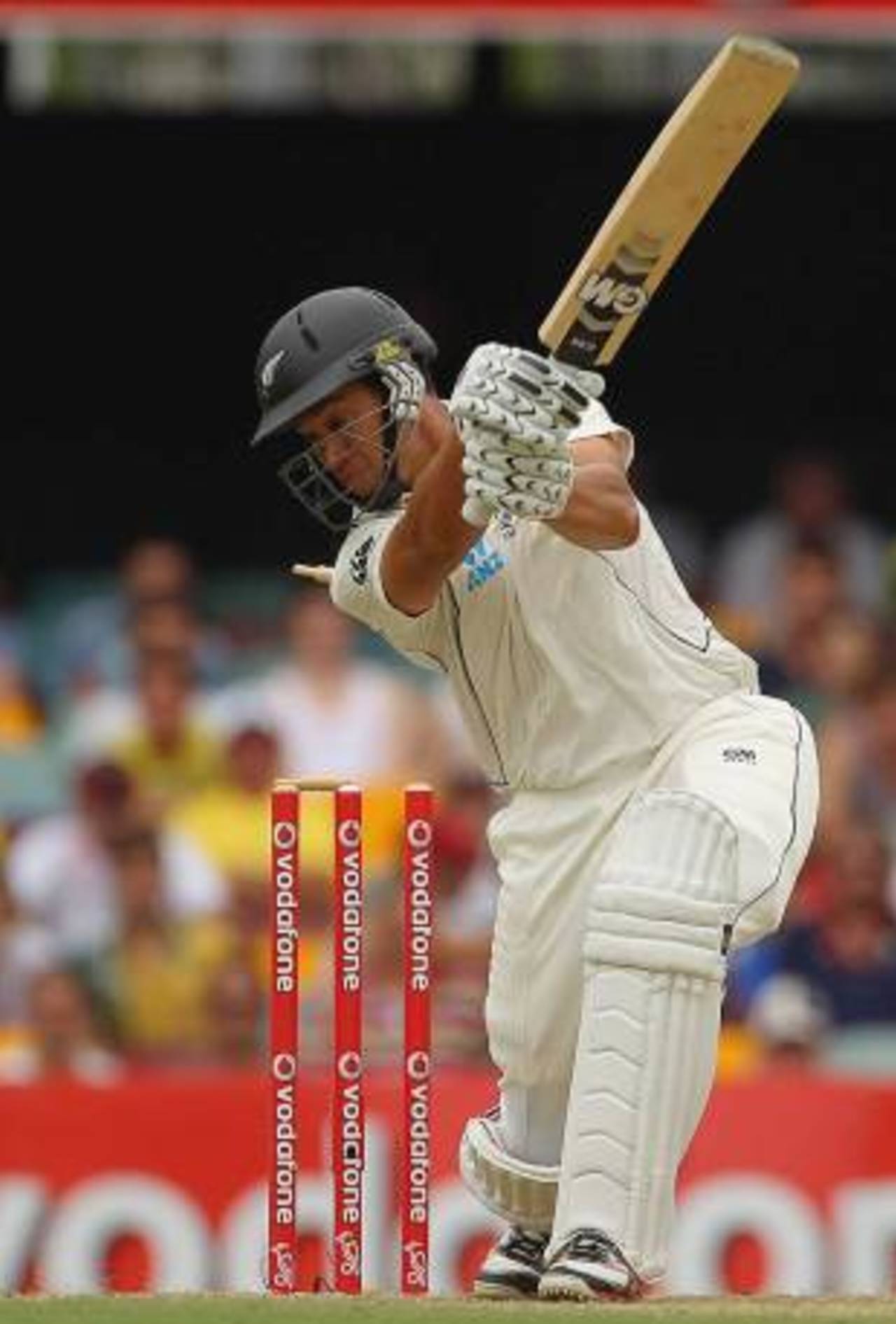Watching a damp first day of the first Test of the Australian summer, it was hard not to conclude the occasion had played as much a part in a muddled day's cricket as the attributes and failings of two modest teams. Years ago, The Band's composer Robbie Robertson had penned the song Stage Fright with the lines, "Your brow is sweatin' and your mouth gets dry / Fancy people go driftin' by. The moment of truth is right at hand / Just one more nightmare you can stand." In Brisbane there seemed to have been plenty of players on both sides who endured a sleepless night before curtain-up.
First it was Australia, then New Zealand, then Australia again. The hosts and the visitors took turns fluffing their lines on the first day, before the weather decided to fluff its own by serving up dull light, then a storm. Neither side looked quite ready for the mental demands of a Test. New Zealand having played only three such matches this year, and Australia sporting three debutants, plus another trio with a mere 24 matches between them.
The captains had made all the appropriate noises on match eve, while the coaches, John Wright and Mickey Arthur, are widely known as advocates for those two accomplices - patience and pressure. Arthur, of course, has only been Australia's coach for a week, and at times in the lead-up it felt as though the sheer newness of the team and its support staff might overwhelm the hosts even as they faced one of the world's more modest international teams. Wright has had more time with his men, but few Test matches with which to educate them. The last,
against Zimbabwe, took place on a Bulawayo pitch about as similar in character to the Gabba surface as the earth is to the moon.
On a helpful pitch under skies amenable to swing,
Michael Clarke's young pace attack made a halting start, before tightening up just enough to coax Brendon McCullum,
Ross Taylor and Jesse Ryder into three of the daftest shots seen on the first day of a Test match. Gifted the momentum by these strokes, the Australians then contrived to drop Dean Brownlie twice, allowing him and Daniel Vettori to mount something of a recovery.
Clarke and Taylor are new leaders, both possessing talent, but on the first day of the series each had moments to remember, and others to forget. Taylor's decision to bat upon winning the toss was brave, backing the aggression of Brendon McCullum to transcend conditions best described as slow and seaming. But his haywire over against James Pattinson, culminating in an edge onto the stumps little more than a minute before lunch, was indefensible.
Marshalling a bowling attack composed of three striplings and Peter Siddle, Clarke might have made an early misstep by giving Pattinson the first over of the match. He certainly erred by not having Siddle or another man of experience at mid-on or mid-off to ease the nerves, and Pattinson was set about by McCullum to surrender 13 from his first six deliveries in Tests. Clarke and his bowlers would improve from there. In Mitchell Starc, he located a left-arm bowler with plentiful natural gifts but also a tendency to be lucky - Napoleon Bonaparte would have considered him for General after watching McCullum pick out point with an airy cut.
Less fortunate was Usman Khawaja, who does not look a natural at short leg. Plenty of deliveries flew past him or at him, and a trio of difficult chances went to ground. He would claim an easier one, but a tendency to place his weight on his heels made Khawaja look like he was under the helmet because he was one of the juniors in the top six, rather than for any accomplishment close to the bat.
The most compelling passage took place when Nathan Lyon joined the fray before lunch, gaining sharp spin and disconcerting bounce to defeat Kane Williamson - an apparent graduate of the Blair Pocock / Matthew Sinclair school of footwork - while ever so nearly tempting Ryder to push a catch to cover with his first ball. The Gabba can offer useful early spin while the pitch is still somewhat moist, as Daniel Vettori had discovered the first time he played at the Gabba in 1997. Lyon exploited it artfully, and had plenty of support from Clarke's fields. Ryder did not settle from his early tribulations against Lyon's spin, and shortly after resumption followed McCullum in carving Starc straight to point.
Grateful for these offerings from opponents unsure of themselves, Australia would nonetheless go on to spurn all further ones. Brownlie's origins are in Western Australia, and his mind appeared to wander back west when he picked out Clarke at slip, then Warner at point. But both chances went down, much to the surprise of the crowd, and perhaps to the sly advantage of Steve Rixon, the fielding coach absent from Gabba preparations as he negotiates the possibility of another contract. Rixon's drills had Australia fielding more sharply than at any time for some years, in Sri Lanka and South Africa.
The reprieves allowed Brownlie and Vettori to craft a fighting stand, and quietly they constructed the most prolonged period of control by either side on the first day of the series. Rain culled 39 overs from the day's play, leaving both sides to ponder plentiful wrong moves. For Australia the occasion seemed to affect a handful of their number, and for New Zealand the fifth wicket fell before there was a full appreciation of the format being played. It is clear the visitors need to play more Test cricket, and equally clear that Clarke's team needs time to settle. The nerves in evidence on day one at the Gabba will not subside otherwise.
Daniel Brettig is an assistant editor at ESPNcricinfo
